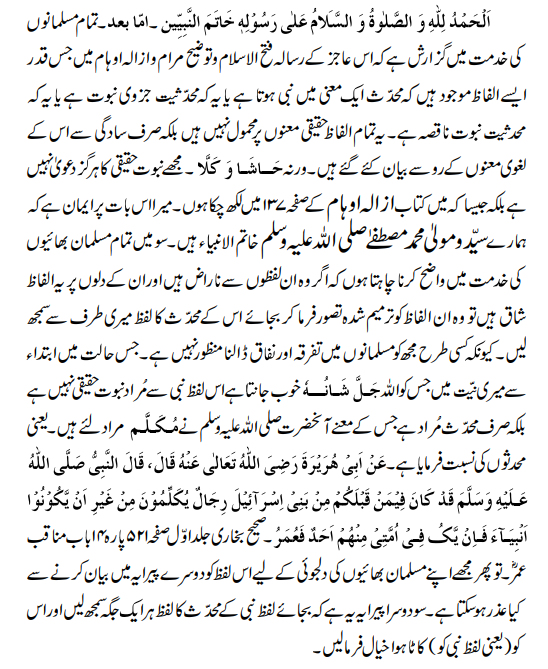In Lahore on 3 February 1892 Hazrat Mirza Ghulam Ahmad issued a
written public declaration at the end of a debate with Maulvi Abdul
Hakim, one of the Muslim Ulama. This writing was signed by
eight witnesses, and it brought to an end the debate with Maulvi
Abdul Hakim. This statement is translated below.
“Be it known to all the Muslims that all such words as occur
in my writings Fath Islam, Tauzih Maram and Izala Auham,
to the effect that a muhaddas is in one sense a prophet,
or that being a muhaddas is partial prophethood or imperfect
prophethood, are not to be taken in their
real sense, but have been used according to their root meaning
in a straight-forward way; otherwise, I lay no claim whatever
to actual prophethood. On the other hand, as I have
written in my book Izala Auham, page 137, my belief is
that our leader and master Muhammad mustafa — may
peace and the blessings of God be upon him — is the Khatam-ul-Anbiya
(Last of the Prophets).
So I wish to make it clear to all Muslim brothers that, if they
are displeased with these words and if these words give injury
to their feelings, they may regard all such words as amended,
and instead consider me to have used the word muhaddas.
For I do not like to create dissension and discord among the Muslims.
From the beginning, as God knows best, my
intention has never been to use this word nabi as meaning
actually a prophet, but only as signifying muhaddas,
which the Holy Prophet has explained as meaning one who is spoken
to by God. Of muhaddas it is stated in a saying
of the Holy Prophet: “Among the Israelites who were before
you, there used to be men who were spoken to by God, though they
were not prophets, and if there is one among my followers, it
is Umar” — Bukhari, v. 1, page 521, part 14,
ch. Virtues of Umar.
Therefore, I have not the least hesitation in stating my meaning
in another form for the conciliation of my Muslim brethren, and
that other form is that in every place
instead of the word nabi the word muhaddas should
be understood, and the word nabi should be regarded as
having been deleted.”
— Majmu‘a Ishtiharat, 2019 edition, volume 1,
pages 329–330
